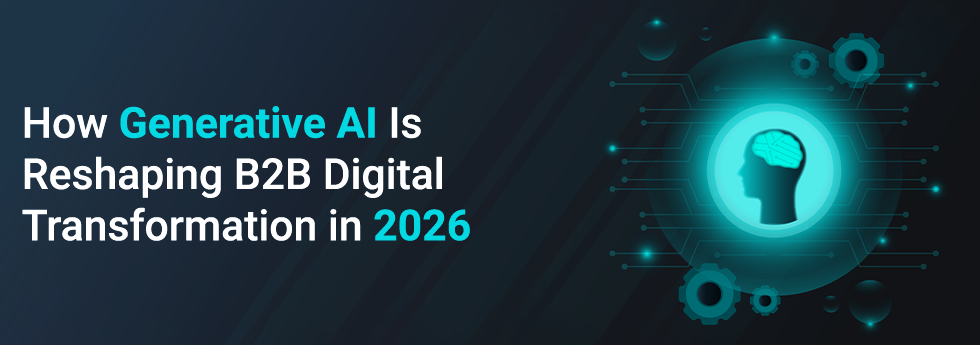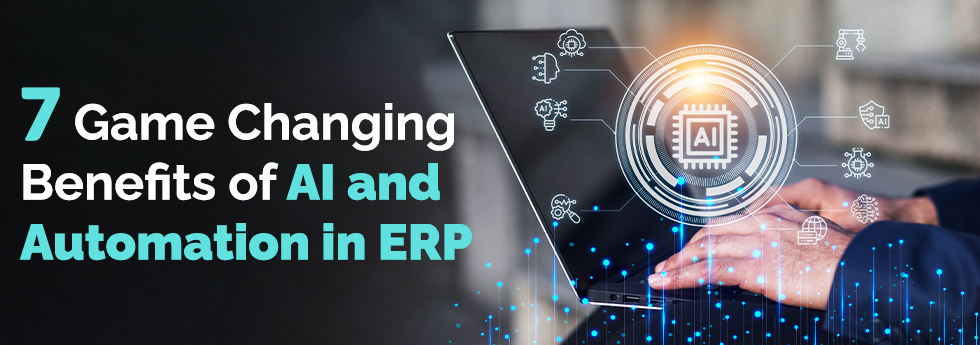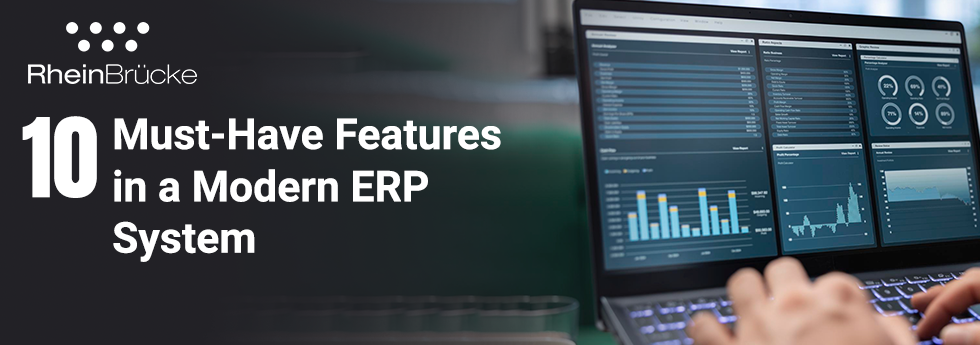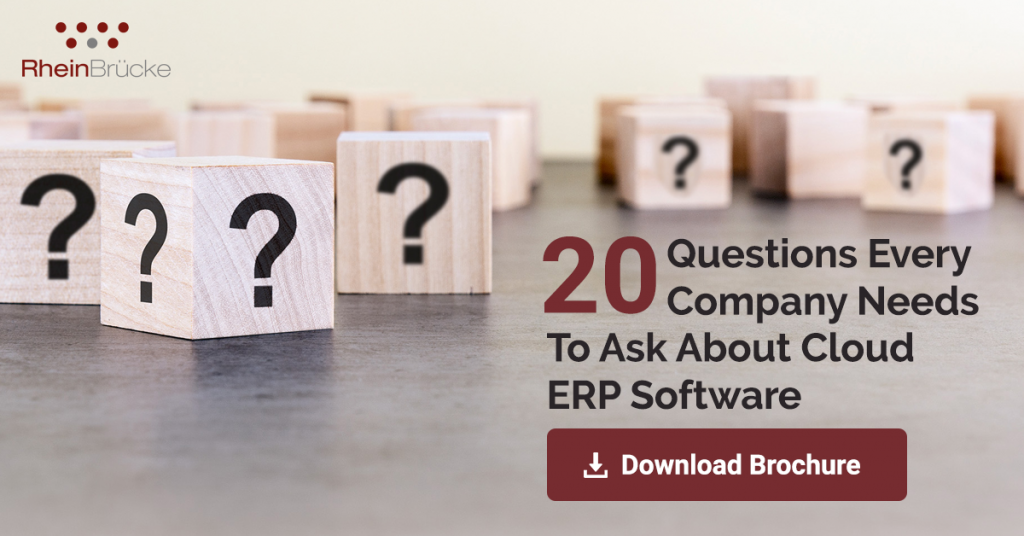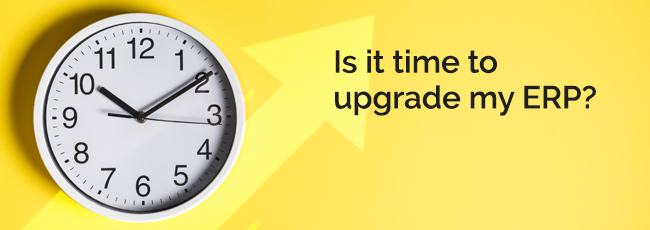
When was the last time you did an ERP (Enterprise Resource System) upgrade? We guess most of your answer would be “not in recent memory”. For most of us, the thought of upgrading ERPs is quite daunting, unlike the way we upgrade to the latest versions of apps or even as we replace our mobile phones, just because upgrading or replacing an ERP can be quite complex. If it would have been simpler, everyone would do it.
Your ERP probably is one of the biggest IT initiatives you have invested in for your business and when you have invested a significant amount for ERP implementation, it is natural to want to keep it running for several years. However, sadly, like most of the technologies out there, your ERP system to becomes outdated over time.
Upgrading ERP is often intimidating due to the disruptions associated with the upgrade activity and the cost involved, especially for small and medium-sized businesses and organizations tend to delay it as much as possible.
Many companies often ask,
“Why and when should you upgrade ERP systems?”
It is never to be forgotten that your ERP system supports many of your core business operations and data. Thus, if your ERP system falls behind, it can directly impact your business processing efficiency and decision-making abilities. Failing to implement or delaying ERP upgrades, and having an outdated ERP, that is incompatible with the current business environment, impedes your business growth and holds you back from staying competitive in the hyperactive world. Not only that, with an outdated ERP you might be putting yourself at extreme security risk as well, like vulnerability to hacking, theft, or viruses. Also, being late to upgrade ERP can bring in additional costs to your business as you may have to jump at least 2 or more versions up in one upgrade, which is a more time-consuming and costly transition.
So, how do you know when is the right time to upgrade your ERP and if you are too late to upgrade your ERP? Well, this can be decided by looking for ‘red flags’ or signs indicating how well your ERP still works and serves the purpose you implemented it for and checking if it is eating up into your time and resources. Over time, you might have grown accustomed to the way your ERP system works even if it has become slightly outdated. But, you have to be watchful if it prevents your company from meeting business goals or satisfying your customer needs. Another situation would be when you are expanding your business either geographically or into new service offerings. That’s perhaps when you should consider an ERP upgrade, as it can make a lot of difference to your efficiency. If you encounter any of the ‘red flags’ below, it may be indicating you are running late to upgrade your current ERP system.
Lack of standard features essential to keep up with customer demand or the shifting landscape and latest trends in the industry – If you are on a legacy ERP system, you might be missing some of the advanced features that modern ERPs today offers and the cutting edge technologies like seamless integration with third party systems, cloud options, advanced analytics, AI, machine learning, IoT, etc that your competitors might already be leveraging.
No support from the software vendor
As newer versions are released, software providers discontinue support for older versions, and most of them usually commit to support for their most recent and preceding version only. If you are on an unsupported ERP version, the critical periodic updates will no longer be available to your system making it more prone to security vulnerabilities.
Unable to integrate with other systems
If your ERP system does not integrate seamlessly with your other systems, such as your CRM or PLM software, it would increase the amount of manual work required to run the systems, spoiling the whole idea of automation and purpose of using an ERP system.
You are struggling to keep your ERP compliant
If your ERP system doesn’t automatically update to be compliant with state and federal regulations, you would need to code manually each time regulations of your industry change taking a considerable amount of your time and efforts to ensure your business is compliant with the latest standards. Modern ERP systems can help you manage compliance with regulatory bodies as well as improve quality assurance and risk management.
Inefficient Processes
An outdated ERP system can hinder activities in different departments of your business from being able to function effectively. In spite of having the latest equipment or advanced machinery for manufacturing, if there are delays in day to day operations or manufacturing processes, due to your legacy ERP system, this may be holding back your teams productivity, with jobs and communications being managed inefficiently.
You have to manually input too much information
If for any reason, you still have to manually input a lot of information, when an ERP is supposed to minimize manual work and any kind of data entry that increases the possibility of errors, it is a major sign to upgrade your ERP.
Your ERP doesn’t run on newer hardware
If you cannot load your ERP to new hardware, say newer servers or your new laptop, it is a strong indication that the technology your ERP is on is outdated. You are also exposed to significant risk if the old hardware fails and you are unable to find replacement parts.
Your ERP is not mobile
Businesses today are becoming increasingly mobile and demands you to be working on the move. Hence mobility has become a critical feature for ERPs today, allowing you to access features of the system on your mobile devices regardless of wherever you are.
Your team is complaining of low productivity
If your ERP system is making your employees frustrated and they feel it is cumbersome or inaccurate, you will never be able to get the benefits of implementing an ERP system and can affect the quality of your processes.
Inadequate reporting and data analytics functions
Reports are important for modern businesses and detailed smart reports are one of the greatest benefits you expect from an ERP system. Modern ERP systems can give you advanced reports using integrated analytics and intelligence and offer many key insights. So, if you are not satisfied with the reports and analytics functions your ERP offers, you should consider upgrading.
You are spending too much employee time and IT support to keep your ERP functioning
Legacy ERP systems often require ongoing maintenance to keep your aging system functioning incurring you extra cost. You might also be facing downtime at critical times sush as quarter ending or year ending, severely impacting your ability to complete timebound activities.
Your ERP is not cloud compatible
ERP on cloud is revolutionizing the way businesses work today. There has been a significant increase in the number of businesses operating on cloud-based ERP systems in recent years owing to cost benefits as well as operational efficiency. If your current ERP solution is not cloud compatible, and even if you are not interested in cloud compatibility at the moment, it is something that you should look for when you are considering an upgrade.
Conclusion
If you face any of the issues above, it is time you consider upgrading your ERP. In spite of the expense that you would have to incur, an ERP upgrade can definitely be a valuable asset that ensures you save a lot of money over the medium to long term. Now, once you have come to the conclusion that your ERP system requires an upgrade, the next thing to think about is how to go about it.
At times you may do well off with a version upgrade. However, a version upgrade is not always the best method to literally upgrade your ERP system. Depending on how outdated your ERP version is and how your business requirements have evolved since the ERP was implemented, you might be better off with other options like an ERP re-implementation or moving to another vendor completely.
Say, if you are using Epicor ERP for your business, an upgrade from Epicor 9 to Epicor 10 is achievable quite easily, but if you are on any of the legacy versions like Vista or Vantage, an upgrade might turn out too complex based on several other factors as well. Getting in touch with expert consultants in the area like RheinBrücke can help you figure out the best option that makes the most sense for your business.
The right vendor will provide your business the best solutions options for ERP system implementations and upgrades by adopting global best practices that help you serve your customers better and always have a competitive edge. Just make sure you don’t leave it too late to do your ERP Upgrade.

